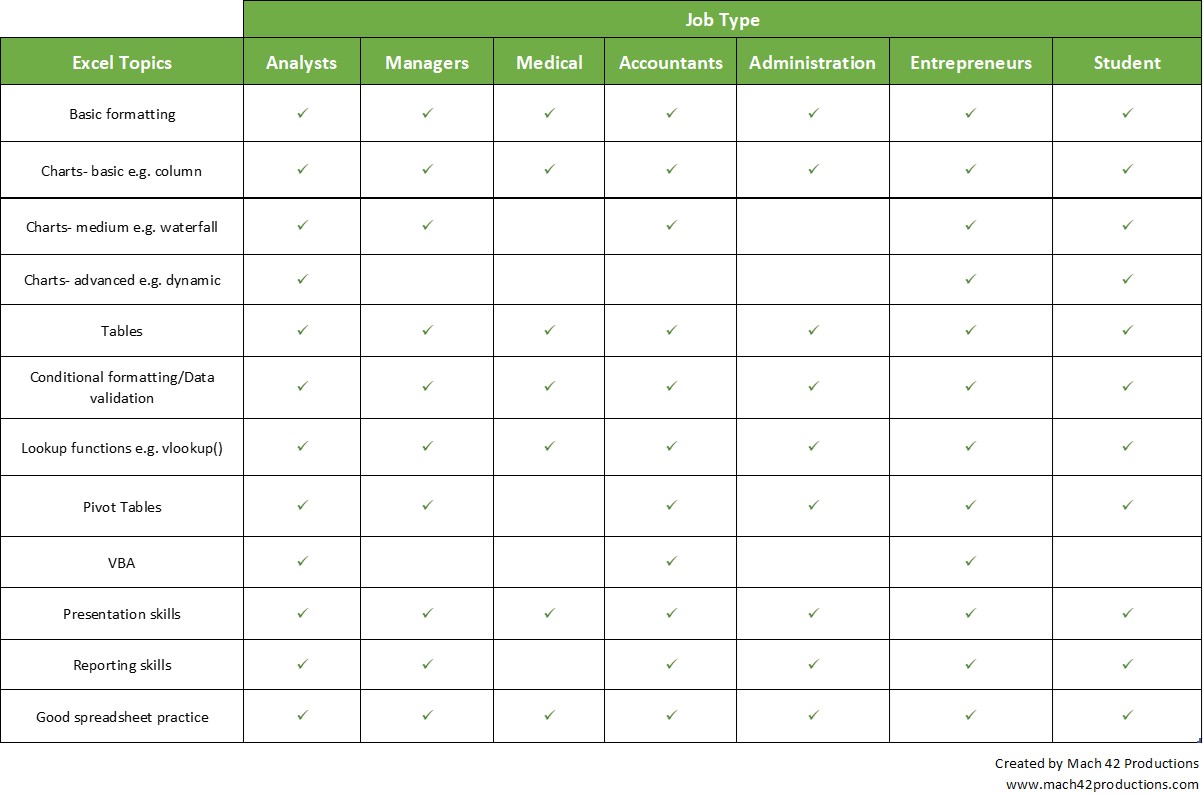Article: The easy free way to publish Excel spreadsheets as PDF files
For the quickest way to send an Excel worksheet (or the entire Excel workbook) as a PDF, do the following steps in Excel:
File --> Save As--> File Type--> PDF
Pay attention to the ‘Options’ button in the PDF dialog box, since you can use this to select which pages from your active worksheet are published or select the entire workbook. By default its set to print the active worksheet and all the pages from that.
So a key takeaway from this is, please make sure you set you page breaks
before you publish any worksheet to PDF.
After you have published your PDF, the default option is to open the PDF.
That’s it!
Article: What can learning Excel in 2021 do for your career?
The world has changed and with that comes the need to stay skilled and agile for your career.
As a consultancy specialising in Excel tutoring and training a vital question often to ask is
why should I learn Excel?
Well Excel can really help boost yours skills in really almost anything. Broadly speaking Excel can:
- Help you to analyse data and identify trends
- Help you to organise information into tables and charts
- Can help you to perform calculations on almost any task
- Can be automated via the programming language VBA
The following table shows you the typical career skills needed in Excel (updated as of
March 2021):

How did we arrive at this? We looked at multiple job listings and postings requiring Excel, in addition to drawing on experience from all the types of people we have taught/worked with and their respective career paths. The table above represents what we feel is needed for the types of work paths listed.
Looking at the list, all of them require a basic competency in Excel formatting, charts, lookup functions, presentation skills and spreadsheet practice (best methods).
The best way we recommend is to use Excel to solve a challenge, which impacts yourself. Typical challenges include:
1. Challenge: You use Excel a lot at work and are struggling.
2. Challenge: You want to advance your career and earn more income.
3. Challenge: You have a business and need Excel to help minimise your costs.
4. Challenge: You are a student and have coursework which requires you to present data on a spreadsheet or PowerPoint presentation.
5. Challenge: You are an apprentice or applying for one and the role requires usage of Excel in daily tasks.
6. Challenge: Your an Entrepreneur and want to use Excel to help get stats for your startup for presentations and driving your business forward e.g. projections, critical mass (users), profitability and other key metrics.
So by learning Excel and the skills attached to that you can aim to solve one or more of these challenges.
Excel can lead to more opportunities and growth too. For example, when I worked as analyst, eventually I became the goto person for Excel related queries. Eventually I did some work from my own initiative which increased productivity by approximately 30% for the organisation I was working for at the time. This turned a lot of heads particularly with senior management and resulted in more interest in my work and more project opportunities within the organisation. Other departments would ask me for my advice for projects they were doing which required heavy Excel usage.
Excel can be also used to create dashboards. In my case I made a live dashboard which showed worker outputs in realtime, complete with a speedometer and displayed on big 60 inch television. It was actually this live dashboard which resulted in the 30% productivity increase mentioned above. So what were the benefits for me?
1. Increased knowledge of Excel
2. Gained attention of senior management which resulted in more project opportunities
3. Helped department to become more efficient
4. Helped other departments in their work
5. Trained other colleagues in Excel
6. Gained increased confidence and happiness in the work I was doing
And the benefits for the organisation?
1. No extra cost for any dashboard software- Since we already had Excel installed, there was no extra software needed
2. Staff became more productive and motivated from dashboard viewing
3. Lead to weekly dashboards which were used for management meetings in addition to the live realtime dashboard.
Of course, its not just about the big projects in Excel. Just knowing how to use Excel at a basic level is game changing. Learning the basics can help for any type of reviewing of spreadsheet data and summarising. Just knowing the fundamentals e.g. how to make a table, create a basic chart, cut/copy/paste data, write formulas and print spreadsheets (with no cut off pages) will increase your productivity and efficiency.
Learning can take several forms but the favoured approach is always to use Excel to solve a particular problem. In the above case the problem was how to increase efficiency in a public sector run department without increasing costs or reducing costs unfavourably (job cuts, freezing salaries). It presented a great challenge but meant I had to really jump in the deep end and learning new Excel techniques and methods. Additionally the dashboard was later automated with VBA to run on its own (including refreshing the data and updating all the charts automatically).
So in conclusion, Excel can really upskill your career- you just have to like any good tool, learn how to use it.
By all means, if you have any queries, please
get in touch. If you would like to take our
Excel course, we offer a full 30 day money back guarantee via Udemy. Or you can check out our
YouTube channel which has plenty of tutorials too.
Thanks and Happy Learning!
